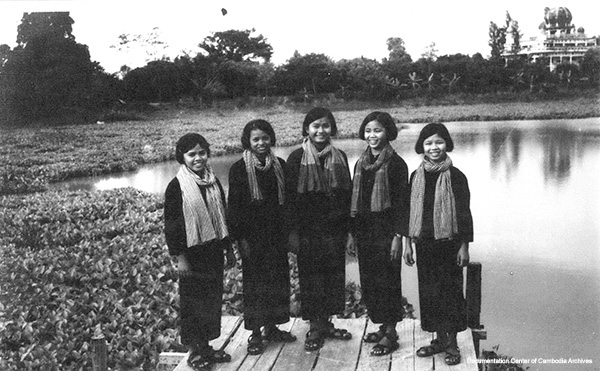|
|
|||
| LIVING DOCUMENTS | |||
 |
|||
| Khmer Rouge Cadres posting in front of a Mosque. Source: Documentation Center of Cambodia Archives. | |||
|
LIVING DOCUMENTS 2004-Present
|
|||
|
Although newspapers, television, radio, Internet, and other media are easy to access in Phnom Penh and some of Cambodia’s other cities, few members of the country’s approximately 1,621 communes (particularly those in rural areas) have the means to obtain information on the forthcoming Khmer Rouge tribunal. This is especially true of many of Democratic Kampuchea’s survivors, who are often poor and whose educations were interrupted by the regime.
Seeing justice done is perhaps the most critical element of the healing process for the survivors. The nearly two million lives lost during the regime can never be brought back, nor can the chance to enjoy the fruits of a society that might have prospered had the Khmer Rouge not come to power - but the tribunals will give survivors an opportunity to know that the world acknowledges their sufferings and that the regime’s leaders must account for their actions.
This project will help ensure the involvement of the regime’s victims in the tribunal by bringing representatives of communes throughout Cambodia to attend a portion of a trial. During the first year of the project, approximately 200 people (in groups of about 30) from representative communes will travel to Phnom Penh and attend a trial for one week. This process would be repeated for each of the ensuing trials, allowing about 1,200 people to attend a trial during the three-year tribunal.
Each representative would then return to his or her village and engage other members of the public in discussions on the proceedings. DC-Cam staff and other experts would attend meetings to field technical questions and film the proceedings. We would also publicize the forums in neighboring villages that did not have a representative at the trials so that their residents can attend.
The project will also help build the momentum for democracy in Cambodia by allowing participants to serve as surrogate witnesses and “judges” at the tribunals; holding open, participatory discussions; making people aware of their “right to know”; and beginning a popular movement to demand more freedom of information. It will give the commune representatives a turn in the public eye (speaking, leading discussions, fielding questions), thus helping to build leaders for future commune and village elections. We intend to strengthen this benefit by giving community innovation and leadership training to emerging commune leaders. |
|||
| ■ | ECCC Tour and Field Trip Reports | ||
| ■ | Photos Gallery | ||
| ■ | ECCC Tour Survey Result | ||
| ■ | Outreach Survey Report | ||
| ■ | Outreach Maps | ||
| ■ | Drama | ||
| ■ | Road Trip - More Screening | ||
| ■ | DC-Cam Calendar of Events January-February-March 2013 | ||
| ■ | DC-Cam Calendar of Events April-May-June 2013 | ||
| ■ | DC-Cam Calendar of Events July-August-September 2013 | ||
| ■ | DC-Cam Calendar of Events October-November-December 2013 | ||
| ■ | DC-Cam Calendar of Events January-February-March 2014 | ||
| ■ | DC-Cam Calendar of Events April-May-June 2014 | ||
| ■ | DC-Cam Calendar of Events July-August-September 2014 | ||
| ■ | Live Screenings at 20 Locations August 5-9, 2014 | ||
| ■ | Live Screening of Case 002/01 Verdict August 7, 2014 | ||
| ■ | DC-Cam Calendar of Events (January - March, 2016) | ||
| ■ | DC-Cam Calendar of Events (October - December, 2016) | ||
| ■ | DC-Cam Calendar of Events (July - September, 2017) | ||
| ■ | DC-Cam Calendar of Events (March-June, 2018) | ||
| ■ | Seven Location of Live Screening of the Final Judgment of Case 002/01, November 21-24, 2016: Khmer | English | Photo | ||
| ■ | Press Release Rutgers Event 28 September 2012: United Nations, Rutgers University and the Documentation Center of Cambodia Discuss Justice for Victims of Khmer Rouge | ||
|
For
additional information, please contact: Vanthan Peoudara Deputy Director |
|||